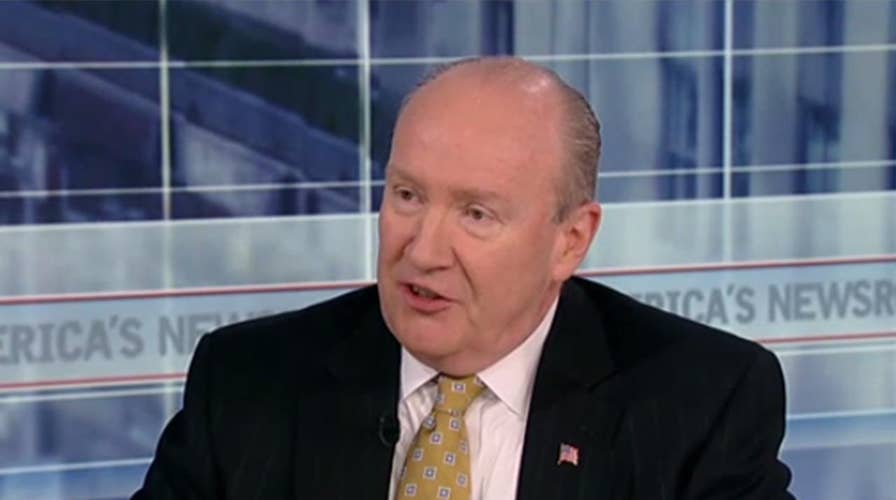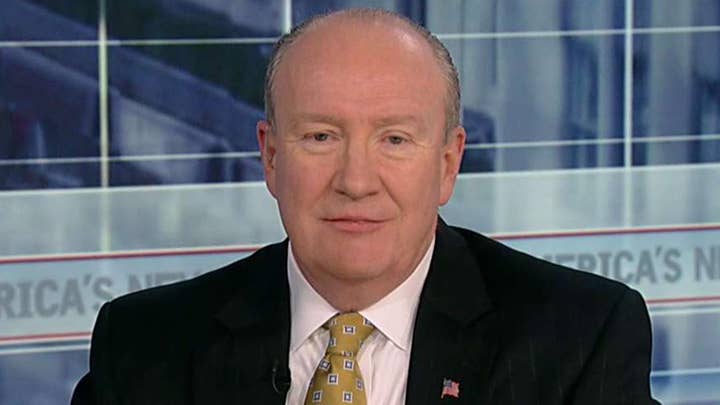Does Andy McCarthy see a crime in the transcripts?
Andy McCarthy discusses the transcripts and if Adam Schiff will ever testify
Is it an impeachable offense?
That is the question of the hour. On “Fox News Sunday,” Chris Wallace pressed it on Republican Congressman Will Hurd of Texas. It is a question every Republican supporter of President Trump should be prepared to answer. Democrats, by contrast, determined that the president was impeachable before he ever darkened the Oval Office door; it’s not worth asking them since their answer preexisted any real or imagined occasion for posing the question.
It is, of course, the question that must be asked. That does not make it a fair question. It is unfair because it assumes a fact that is not in evidence, namely: that we have a working definition of an impeachable offense on which there is agreement – or at least something close to consensus. We don’t.
REPORTER'S NOTEBOOK: THE 'IMPEACHMENT RESOLUTION,' AND DEMS' FIGHT OVER ITS MEANING
In fact, even that explanation of the problem is misleading. To have a “working definition” in this context implies that we are dealing with a legal reality – as if the question were, Is it a contract? Or, Is it a homicide? A contract or a homicide is a legal designation with a settled definition applicable in all circumstances.
By contrast, an impeachable offense is not a legal designation. It is, in our system, a political conclusion.
Well, OK, even that is an oversimplification. I grappled with the problem – at the crossroads of law and politics – in my 2014 book on the impeachment, “Faithless Execution.” (I wasn’t smart enough to wait until Donald Trump was president to write an impeachment book – I might have made a few bucks!)
The “impeachable offense” question comes down to whether a president’s alleged misconduct amounts to “high crimes and misdemeanors.” On this, the Framers believed they had a legal definition, although one more elastic than those that define offenses in the penal code. As Hamilton put it in “Federalist 65,” high crimes and misdemeanors are offenses that:
"...proceed from the misconduct of public men, or in other words from abuse or violation of some public trust. They are of a nature which may with peculiar propriety be denominated POLITICAL, as they chiefly relate to injuries done immediately to the society itself."
Legally, then, impeachable offenses need not be courtroom-prosecutable crimes. They are in the nature, instead, of abuses of power, derelictions of the office holder’s fiduciary duties.
Sounds straightforward enough. Except it’s not. The Framers, you see, did not leave impeachment to judges. They left it to Congress, i.e., to a *political branch.* And because they feared that this could give the legislature too much power over the executive, or that a politicized faction in Congress could exploit the impeachment power frivolously against a rival president, they made impeachment-and-removal very difficult to do.
A simple House majority may vote articles of impeachment, but it takes a two-thirds’ supermajority of the Senate to convict – i.e., to oust the president from office.
That is not the way things work with straight legal questions. In those, an impartial factfinder reaches the legal conclusion under the guidance of an impartial judge. In theory, it’s a simple application of legal definitions to the facts of the case.
Impeachment, to the contrary, is left to the politicians. Moreover, the supermajority requirement in the Senate assures that no misconduct will be found impeachable unless the public strongly and broadly believes the president should be removed. Only that intense political pressure would spur two-thirds of the Senate to convict, regardless of partisan loyalties.
So the question is never as simple as, Is it an impeachable offense?
We’re not going to court, where an independent judge could instruct an objective jury on Hamilton’s definition of high crimes and misdemeanors.
This question goes to Congress. And it goes as a political question, which is much different: Even if we have misconduct that is abusive enough to meet Hamilton’s definition, is it so egregious that the nation is convinced it warrants the president’s removal from office?
That depends on the circumstances. Let’s say you believe the president abused his power by asking Ukraine to investigate the Bidens for violations of Ukrainian law in order to help his 2020 campaign – something that has not been established, but that people could reasonably conclude happened. You might conclude that this misconduct would meet Hamilton’s definition of an impeachable offense.
But you might also quite reasonably conclude that it is not impeachable under the circumstances.
More from Opinion
Remember, the Ukrainians got their defense aid – which was in addition to defense aid President Trump was already providing to them, aid that President Obama denied for years, with no objection from Democrats, despite Russian aggression. The Ukrainians did not have to agree to investigate the Bidens to get the aid.
CLICK HERE TO GET THE OPINION NEWSLETTER
Plus, there would have been nothing wrong with Trump’s conditioning aid to a notoriously corrupt country on its commitment to combat corruption generally; nor would there be any impropriety in the president’s asking Ukraine to assist the Justice Department’s ongoing probe of the origins of the Obama administration’s 2016 Trump-Russia investigation – which appears to have had a Ukrainian component (Ukrainian investigative agencies being pressed by American agencies and Democrats to investigate Paul Manafort, Trump’s one-time campaign chairman; Ukrainian officials colluding with the Clinton campaign).
CLICK HERE TO GET THE FOX NEWS APP
To ask whether a president engaged in misconduct is usually to posit a clear-cut question. To ask whether a president committed an impeachable offense, however, is a loaded question. It implies the fraught political calculation: Is what happened so serious that the president should be removed from office.
As the Framers’ formula instructs, and as President Bill Clinton’s impeachment confirms, the answer to that question is: It depends. On the facts of the Ukraine episode, the answer is no.

